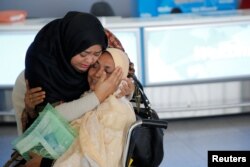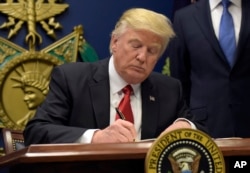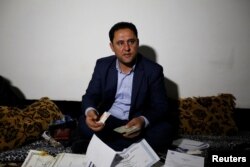An Iraqi parliamentary committee asked the country's government Sunday to "reciprocate" against the controversial U.S. immigration curbs imposed by U.S. President Donald Trump on citizens from seven Muslim countries.
The Iraqi government so far has not commented publicly on President Trump's executive order barring residents of Iraq, Syria, Iran, Sudan, Libya, Somalia and Yemen from entering the United States for 90 days. The Trump executive order places also an indefinite ban on admission of Syrian refugees and a 120-day ban on all other refugees.
But officials in Baghdad say they will lobby the U.S. administration to overturn the curbs or at least soften the executive order's impact on Iraqis.
And they plan to warn the White House that the temporary immigration ban risks undermining cooperation in the war on the Islamic State terror group.
Governments in other Arab countries have been muted in their public responses to the ban, opting to lobby Washington strongly behind the scenes.
United Arab Emirates and Saudi leaders were to speak by phone Sunday with President Trump. According to an official in Dubai who spoke to VOA on the condition of anonymity, they planned to caution the U.S. president not to add either emirate to the travel ban list.
White House officials on Saturday warned other countries could be added to the seven states already listed in the executive order, "Protecting the Nation From Foreign Terrorist Entry Into the United States."
Four U.S. federal judges have imposed stays on the travel ban, which applies to refugees and visa holders – including U.S. permanent residents – born in any of the seven countries listed. The judges issued rulings in quick succession, blunting the order's effect as rights lawyers called its constitutionality into question.
Iran on Saturday announced it would bar all U.S. citizens from entering the Islamic republic in retaliation for the curbs on its citizens. In a statement, Iran's foreign ministry dubbed Trump's order "an obvious insult to the Islamic world." The statement described the travel ban as "a big gift to extremists and their supporters."
Tehran further cautioned that the U.S. ban would not make America safer. The ministry said its retaliatory measures would remain in place until the U.S. restrictions were lifted.
Administration claims overreaction
White House officials say the ban on citizens from Iran, Iraq, Libya, Somalia, Sudan, Syria and Yemen is part of an effort to stop terrorists from entering the United States.
Trump and his aides say those who oppose the executive order are overreacting. "It's not a Muslim ban," the president told reporters in the Oval Office. "We were totally prepared. It's working out very nicely. You see it at the airports, you see it all over. It's working out very nicely."
That isn't the view of European leaders. While Arab governments have opted so far for a quieter lobbying approach on the travel ban, Trump's executive order has sparked a wave of outrage not only across the Middle East but in Europe, where national leaders denounced the ban.
On Saturday, French President Francois Hollande said defending democracy "requires observing fundamental principles," among them welcoming refugees. "And when he [Trump] refuses the arrival of refugees, while Europe has done its duty, we have to respond," the French leader said in a statement issued by his office.
Luxembourg warned that Trump immigration curbs risk bolstering "hatred towards the West." The country's foreign minister, Jean Asselborn, condemned the move, saying, "The decision is bad for Europe, because it's going to strengthen even further the mistrust and hatred towards the West in the heart of the Muslim world."
"The American president is dividing the Muslim world into good and evil with this," Asselborn told the German newspaper Tagesspiegel.
The French and German foreign ministers, meanwhile, voiced their concern after talks in Paris.
"Welcoming refugees who are fleeing war is part of our duty," France's Jean-Marc Ayrault said after a meeting with his new German counterpart, Sigmar Gabriel. "This decision can only cause us concern. But there are a lot of other issues that are causing us concern," Ayrault said, with Gabriel at his side.
German Chancellor Angela Merkel criticized Trump's immigration curbs. She said it is "not justified to put people from a specific background or faith under general suspicion" in order to combat the terrorism of the few.
A spokesman for Merkel said, "The chancellor regrets the U.S. government's entry ban against refugees and citizens of certain countries. She is convinced that even the necessary, resolute fight against terrorism doesn't justify putting people of a particular origin or particular faith under general suspicion."
Britain's Prime Minister Theresa May, who met Trump in Washington Friday, was careful while visiting Turkey the day after to refrain from criticizing the curbs. But on Sunday she shifted position, issuing a midnight statement saying she does not agree with the policy.
May said she would appeal to the U.S. if the ban affected British citizens who hold dual citizenship with any of the listed countries. "We do not agree with this kind of approach and it is not one we will be taking," she said in a statement from Downing Street.
Her statement came after an Iraqi-born British lawmaker from May's Conservative Party revealed he had received confirmation he would not be allowed to enter the U.S. The leaders of Britain's main opposition parties are now calling for May to withdraw her invitation for Trump to visit Britain.
Soldiers decry ban
In Mosul, where Iraqi forces are battling militants in a bid to oust the Islamic State terror group from its last major urban stronghold in Iraq, soldiers expressed anger at the ban, saying it could prevent them from visiting relatives in the United States.
"It's not fair, it's not right. I should have the right to visit my family,"Assem Ayad, a 23-year-old soldier deployed in Mosul who has three cousins living in Texas, told AFP news agency. "This decision was made because there are terrorist groups in Iraq. But there are also innocent people" including those who are fighting against militants, added Ayad.
Another Iraqi soldier, Haider Hassan, told AFP he has a cousin living in the United States who he wants to visit. Referring to U.S. military personnel deployed in Iraq, Hassan asked: "Why would they ban us from coming to America when they are in my country and have bases here?"














